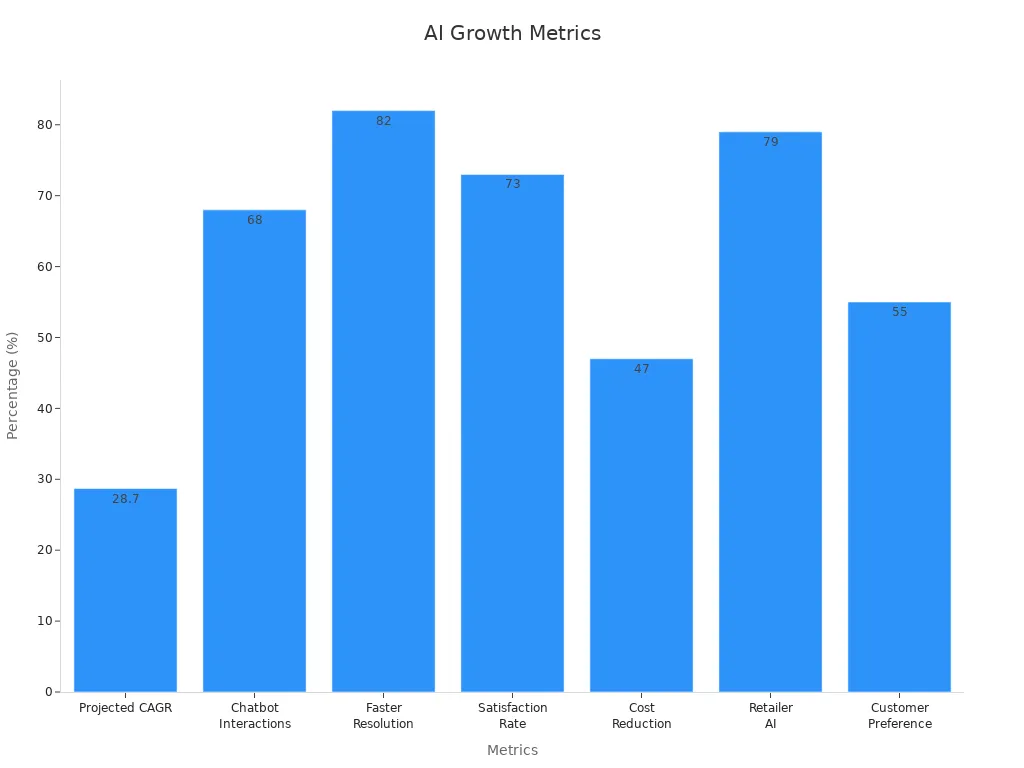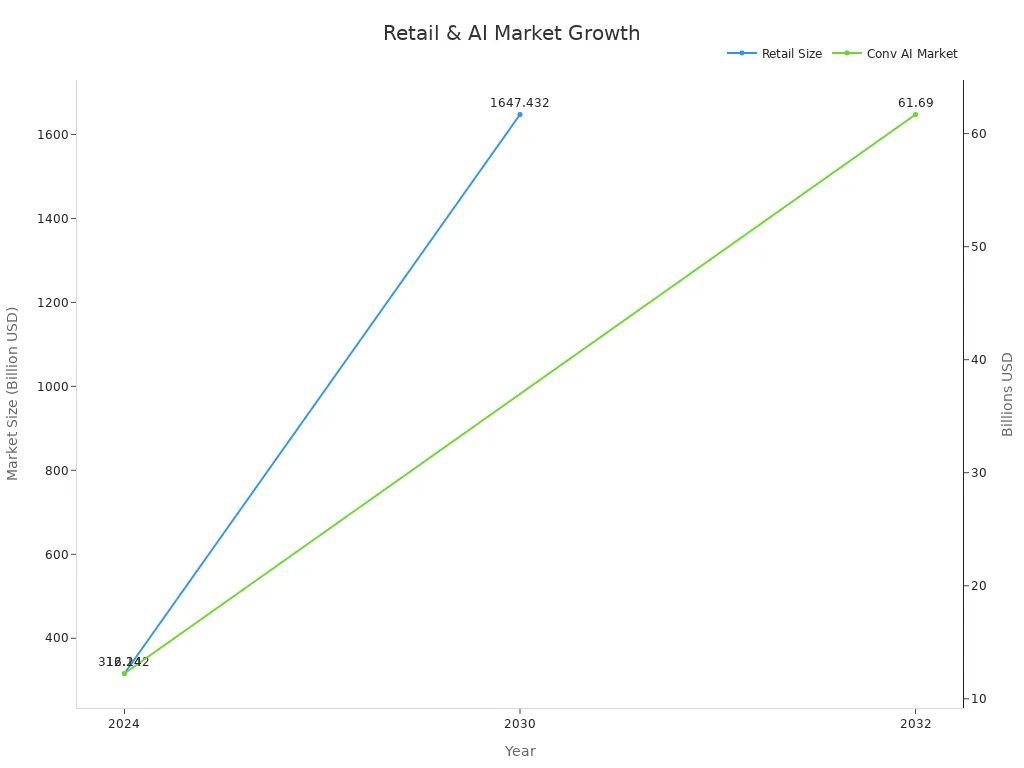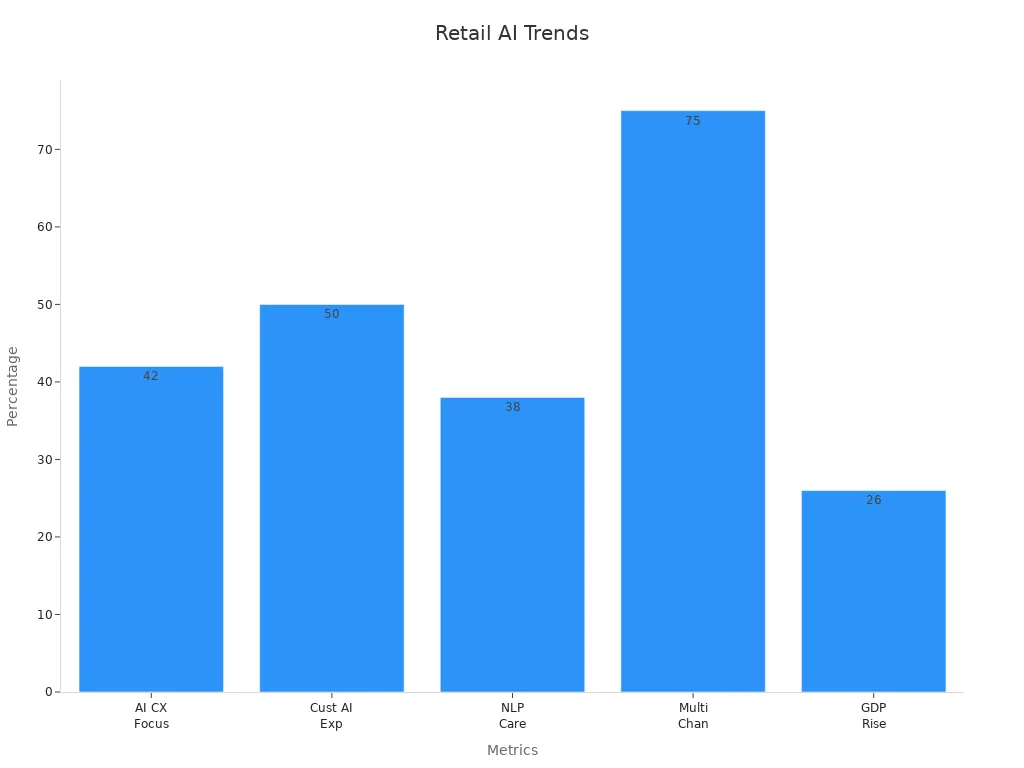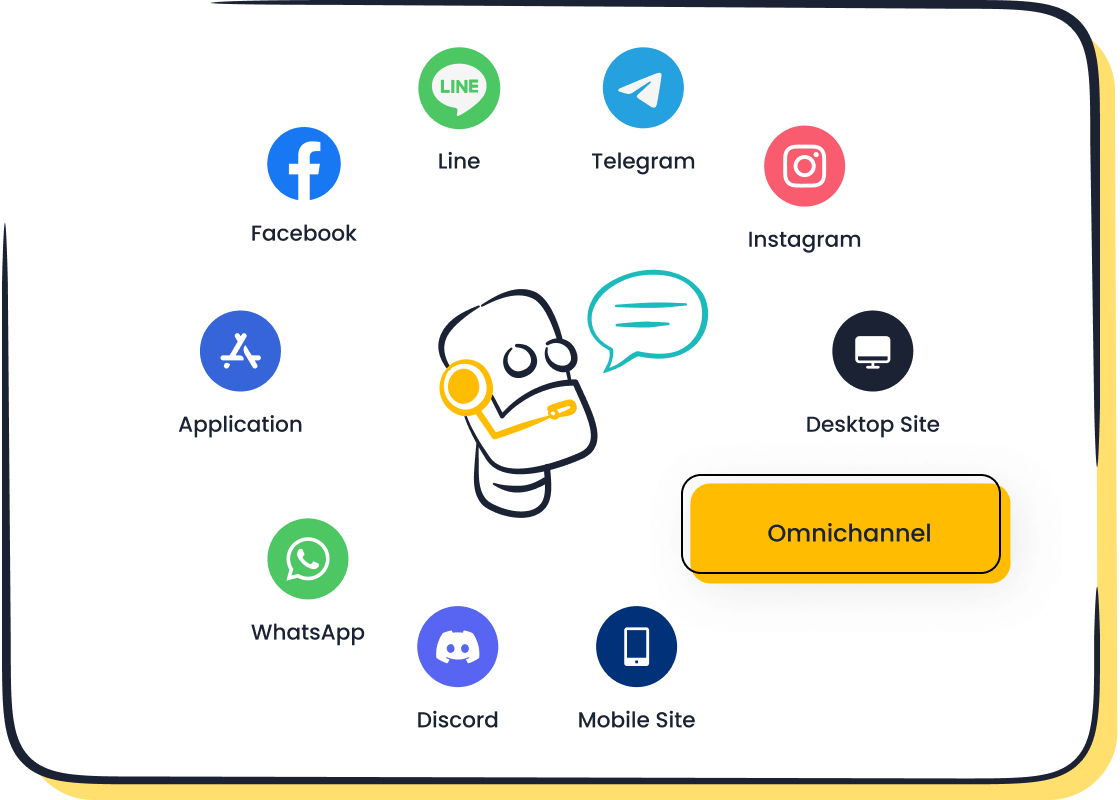Key Conversational AI for Retail Trends to Watch Now

Retail leaders see conversational AI transforming the industry in 2025 through trends like AI shopping assistants, hyper-personalization, and conversational commerce. Adoption of chatbots now reaches 68% in retail, with customer inquiries resolved 82% faster and operational costs dropping by 47%. Sobot AI empowers brands like Michael Kors to unify channels and deliver superior customer experience, as shown by their 83% faster response times and 95% satisfaction rates.

Retail professionals gain a competitive edge by embracing conversational AI for retail, focusing on measurable improvements in customer satisfaction, automation, and adoption.
Conversational AI for Retail
Market Growth
Conversational AI for retail is experiencing rapid expansion. The global conversational AI market reached USD 13.6 billion in 2024 and is projected to soar to USD 151.6 billion by 2033, with a compound annual growth rate (CAGR) of 29.16%. Retail and e-commerce account for 22.8% of this market, making them leading segments in enterprise adoption. North America holds the largest regional share, driven by advanced technology and strong demand. The market for AI in retail also shows impressive growth, with a value of USD 316.142 billion in 2024 and a projection of USD 1,647.432 billion by 2030, reflecting a CAGR of 32.01%.
Retailers are investing in conversational AI to meet rising customer expectations and streamline operations.
| Metric | Value | Notes |
|---|---|---|
| Global Market Size (2024) | USD 13.6 billion | Conversational AI global valuation |
| Projected Market Size (2033) | USD 151.6 billion | Forecasted size |
| CAGR (2025-2033) | 29.16% | Annual growth rate |
| Retail & E-commerce Market Share (2024) | 22.8% | Leading segment |
| North America Market Share (2024) | Over 28.6% | Largest region |
Sobot stands out as a leader in this space, offering advanced chatbots that help retailers automate customer service and boost efficiency. Sobot’s Chatbot product supports omnichannel engagement and 24/7 support, making it a preferred choice for enterprise adoption in the retail sector.
Key Drivers
Several factors drive the adoption of conversational AI for retail. Retailers seek to improve customer satisfaction, reduce costs, and increase revenue. Chatbots and virtual assistants provide instant, personalized responses, which enhance customer engagement and streamline issue resolution. The adoption of conversational AI leads to a 15-20% increase in customer satisfaction, a 10-15% reduction in costs, and a 5-10% boost in revenue within 6-12 months of implementation.
| ROI Metric | Retail Sector Impact | Implementation Period |
|---|---|---|
| Customer Satisfaction Improvement | 15-20% increase | 6-12 months |
| Cost Reduction | 10-15% decrease | 6-12 months |
| Revenue Impact | 5-10% increase | 6-12 months |

Retailers like Michael Kors have already realized these benefits by adopting Sobot’s solutions. Sobot’s chatbots enable seamless omnichannel support, proactive messaging, and real-time assistance, which drive measurable improvements in customer experience and operational efficiency.
Conversational AI Trends 2025
Retailers face a rapidly changing landscape. New conversational AI trends shape how brands connect with customers and drive growth. In 2025, three trends stand out: AI shopping assistants, hyper-personalization, and conversational commerce. Each trend transforms customer interactions, boosts sales, and sets new standards for personalized shopping.
AI Shopping Assistants
AI shopping assistants have become essential in retail. These assistants guide customers through product discovery, answer questions, and offer recommendations in real time. Retailers use chatbots and virtual assistants to automate support and create seamless interactions across channels. Sobot’s AI Chatbot, for example, provides 24/7 support, multilingual service, and proactive messaging, helping brands deliver instant, accurate responses.
The impact of AI shopping assistants is clear. Many leading retailers report significant improvements in engagement, satisfaction, and sales. The table below highlights real-world results:
| Retailer | AI Application | Performance Indicator | Outcome |
|---|---|---|---|
| Sephora | AI Chatbot for beauty advice | App engagement, sales | 25% increase in app engagement; 15% sales growth |
| H&M | Chatbot for product questions | Customer satisfaction, response time | 30% higher satisfaction; faster responses |
| Nike | AI and AR for shoe fitting | Sales growth | 30% increase in sales |
| Macy’s | Dynamic pricing with AI | Revenue, inventory | 15% revenue growth; better inventory management |
| Target | AI-driven analytics | Promotion ROI, retention | 25% more effective promotions; 10% higher retention |
Retailers using AI shopping assistants see faster service, higher satisfaction, and more conversions. Sobot’s AI Solution enables brands to automate regular queries, assist agents, and boost productivity by up to 70%. These assistants handle most customer interactions, freeing staff to focus on complex needs.
Hyper-Personalization
Hyper-personalization stands at the core of modern retail. Brands use advanced AI to tailor every interaction based on customer preferences, behaviors, and purchase history. Sobot’s Chatbot leverages intelligent personalization to deliver relevant product suggestions and proactive offers, creating a unique experience for each shopper.
Key elements of hyper-personalization include:
- In-store technologies like smart shelves and AI-powered displays create real-time, tailored interactions.
- Behavioral tracking data shapes store layouts and content, increasing engagement.
- Unified customer profiles combine online and offline data for better recommendations.
- Predictive analytics optimize inventory and prevent out-of-stocks.
- Electronic shelf labels and mobile apps enable instant updates and personalized rewards.
- Visual search, smart mirrors, and facial recognition personalize discovery and offers.
- Bluetooth beacons send hyperlocal alerts and enable frictionless checkout.
These strategies drive customer loyalty, higher spending, and competitive advantage. Retailers using hyper-personalization report increased engagement and stronger emotional connections. Sobot’s AI Solution helps brands unify data, automate personalized messaging, and deliver consistent experiences across all channels.
Conversational Commerce
Conversational commerce transforms how customers shop and interact with brands. This trend uses chatbots, messaging apps, and voice assistants to enable real-time transactions and support. Customers can ask questions, get recommendations, and complete purchases within a single conversation. Sobot’s omnichannel AI platform supports conversational shopping across chat, email, voice, and social media.
Market research confirms the growing influence of conversational commerce:
| Evidence Type | Details |
|---|---|
| Market Growth Projection | Conversational commerce market to reach USD 37.64 billion by 2029 (CAGR 24.03%) |
| Expenditure Forecast | Global spending on conversational commerce channels to hit $290 billion in 2025 |
| Sales Impact | Businesses see a 67% sales increase after implementing chatbots |
| Cart Abandonment Reduction | Conversational commerce reduces cart abandonment, improving purchase completion |
| Real-World Retail Examples | ASOS, Maybelline, H&M, Amazon, IKEA, Walmart, Domino’s use conversational AI in retail |
| CEO Adoption Insight | Nearly 80% of CEOs plan to change client engagement with conversational AI technologies |
Retailers adopting conversational commerce see higher sales, fewer abandoned carts, and more satisfied customers. Sobot’s AI Solution enables brands to automate sales, support, and marketing, driving measurable results. As conversational AI for retail evolves, brands that embrace these trends gain a clear edge in customer engagement and operational efficiency.
Tip: Retailers who invest in conversational AI trends like AI shopping assistants, hyper-personalization, and conversational commerce position themselves for long-term success. Sobot’s AI-powered solutions help brands deliver seamless, personalized shopping experiences that drive loyalty and growth.
Enhancing Customer Experience

Omnichannel Support
Retailers now rely on conversational AI to deliver seamless omnichannel support. Customers expect to interact with brands through chat, email, voice, and social media. Sobot’s AI-powered platform unifies these channels, allowing agents to manage all customer service interactions in one workspace. This approach reduces friction and ensures consistent experiences across every touchpoint. Michael Kors, a global fashion leader, adopted Sobot’s solution to unify its customer service channels. The result: an 83% reduction in response time and a 95% satisfaction rate. These improvements highlight the value of omnichannel support in retail.
| Metric Name | Description & Relevance to Omnichannel Support |
|---|---|
| Customer Satisfaction (CSAT) | Measures how satisfied customers are with products/services, reflecting the quality of interactions across channels. |
| Customer Effort Score (CES) | Indicates how much effort customers exert to resolve issues or complete purchases, highlighting friction points in omnichannel journeys. |
| Net Promoter Score (NPS) | Assesses likelihood of customers recommending the brand, showing loyalty and satisfaction influenced by consistent omnichannel experience. |
| Churn Rate | Tracks customers who stop buying or unsubscribe, revealing issues in channel integration or customer journey coherence. |
| Average Order Value (AOV) | Measures average spend per order, indicating success in upselling and cross-selling through omnichannel visibility and accessibility. |
| Buy Online Pickup In Store (BOPIS) | Reflects adoption of integrated online-offline shopping methods, showing convenience and operational efficiency. |
| Customer Acquisition Cost (CAC) | Shows cost efficiency in attracting customers across channels, helping optimize channel profitability. |
| Customer Lifecycle Value (CLV) | Estimates total revenue from a customer over time, demonstrating the impact of omnichannel strategies on loyalty and retention. |
Operational and experience data together help retailers identify friction points and optimize the customer journey.
Real-Time Automation
Conversational AI brings real-time automation to retail. Sobot’s chatbot handles regular queries, order tracking, and proactive support instantly. Customers receive immediate answers, which reduces wait times and boosts satisfaction. Michael Kors used Sobot’s automation to streamline customer service, leading to faster resolutions and higher loyalty. Real-time automation also enables proactive support, such as sending order updates or personalized offers before customers ask. This approach increases customer engagement and ensures every interaction feels timely and relevant.
Personalization
Personalization shapes the modern customer experience. Conversational AI uses data to tailor interactions, making each customer feel valued. Sobot’s AI-driven platform delivers personalized recommendations and dynamic content based on customer preferences and behavior. Retailers see strong results:
- 56% of consumers make repeat purchases from brands offering personalized experiences, showing a direct link to loyalty.
- AI-driven micro-segmentation improves marketing relevance and deepens engagement.
- 60% of consumers become regular customers after personalized shopping experiences.
- Personalized content leads to more repeat visits and purchases.
- Businesses gain higher ROI from personalized campaigns, as offers match customer needs.
Personalization reduces churn and builds loyalty. Sobot’s solutions help retailers create personalized interactions that drive satisfaction and long-term customer engagement.
Voice and Multimodal AI in Retail

Voice Assistants
Voice assistants have become a powerful tool in retail. They help customers search for products, check order status, and receive recommendations using natural language. The market for voice assistants in retail reached USD 2.8 billion in 2021 and is projected to grow to USD 11.2 billion by 2026, with a strong CAGR of 32.4%. North America leads this trend, holding 34.5% of the market share. According to Capgemini, 41% of consumers prefer using voice assistants over websites or apps for online shopping. Many smart speaker owners interact with their devices daily, with 44% using them several times a day (source). Retailers see these assistants as a way to boost engagement and streamline service.
| Evidence Aspect | Details |
|---|---|
| Market Size (2021) | USD 2.8 billion |
| Projected Market Size (2026) | USD 11.2 billion |
| CAGR (2021-2026) | 32.4% |
| Leading Vertical Segment | Smart retail and eCommerce application area |
| Consumer Preference (Capgemini 2017) | 41% of consumers prefer voice assistants for online shopping |
| Regional Market Leader | North America with 34.5% market share |
| Usage Frequency (Adobe 2018) | 71% interact daily; 44% several times a day |
Sobot’s AI platform supports voice-enabled assistants, allowing retailers to deliver fast, hands-free service. These solutions help brands meet rising customer expectations and improve overall efficiency.
Multimodal Interactions
Retailers now use multimodal interactions to create richer customer experiences. Multimodal AI combines voice, text, images, and even video in a single conversation. Customers can ask questions by voice, receive product images, and get instant answers in chat. This approach makes shopping more interactive and accessible.
Sobot’s omnichannel solutions enable seamless interactions across chat, voice, and social media. For example, a customer might start a conversation with a chatbot, switch to voice for detailed help, and receive a product video—all in one session. This flexibility increases engagement and satisfaction. Multimodal interactions also help brands reach more customers, including those who prefer different communication styles. As technology advances, retailers will rely on these tools to deliver personalized, efficient service at every touchpoint.
Note: Multimodal AI helps retailers adapt to changing customer needs and expectations, making every interaction more meaningful.
Generative AI and Analytics
Generative AI
Generative AI is changing the landscape of conversational AI for retail. Retailers use these advanced tools to create personalized content, automate customer interactions, and analyze large amounts of data. The market for generative AI is growing quickly, with a projected compound annual growth rate (CAGR) of 46%. By 2030, the market size could reach $356 billion, showing the huge opportunity for retailers to invest in these technologies. Over 60% of companies now invest in generative AI for customer service, and 69% believe it helps humanize digital interactions. Many large firms experiment with customer-facing generative AI, and 76% plan to add these tools to their support systems in 2024.
| Metric / Statistic | Value / Percentage | Relevance to Retail Analytics and Generative AI Implementation |
|---|---|---|
| Generative AI market CAGR | 46% | Rapid market growth, supporting investment in retail analytics tools |
| Market size by 2030 | $356 billion | Large economic scale and opportunity for generative AI in retail |
| Companies investing in generative AI (customer service) | Over 60% | Strong adoption intent in customer-facing sectors |
| Use cases: Content creation | 40% | Automates content, useful for marketing and analytics |
| Use cases: Customer interaction analysis | 31% | Improves customer insights in retail analytics |
| Organizations believing generative AI humanizes digital interactions | 69% | Enhances customer experience in retail analytics |
| Companies considering adding generative AI to support in 2024 | 76% | Strong intent to integrate generative AI soon |

Sobot’s AI Solution leverages generative AI to automate responses, create dynamic content, and deliver personalized experiences. This approach helps retailers improve efficiency and customer satisfaction with conversational AI for retail.
AI-Powered Insights
AI-powered insights drive smarter decision-making in conversational AI for retail. These insights help retailers understand customer needs, predict trends, and optimize operations. AI analyzes massive datasets in real time, uncovering hidden patterns and generating actionable recommendations. Retailers use these insights to improve marketing, manage inventory, and enhance customer experience.
- AI processes unstructured data, such as reviews and social media posts, using natural language processing and sentiment analysis.
- Omnichannel tracking enables personalized marketing and better customer retention.
- Predictive analytics optimize inventory by considering seasonality and market trends.
- Metrics like customer satisfaction, retention rates, and revenue growth measure the impact of conversational AI for retail.
- AI-powered chatbots, like Sobot’s, provide round-the-clock support and personalized recommendations.
- Real-time scenario simulation helps retailers make informed decisions and maintain a competitive edge.
Sobot’s analytics tools empower retailers to act on these insights, leading to higher efficiency and stronger customer relationships. By adopting conversational AI for retail, businesses gain a clear advantage in today’s fast-changing market.
Challenges and Best Practices
Data Privacy
Retailers handle large volumes of sensitive information every day. Protecting customer data remains a top priority. Regulations such as GDPR and CCPA set strict standards for data privacy. Companies must ensure that conversational AI systems store and process information securely. Sobot’s AI platform uses encryption and regular backups to keep customer data safe. Brands that follow strong privacy policies build trust and reduce the risk of data breaches. Customers expect transparency about how their information is used. Clear privacy notices and easy opt-out options help meet these expectations.
Integration
Integrating conversational AI into retail operations presents several challenges. Technical, organizational, financial, and ethical issues often arise. Studies show that retailers face:
- Technical barriers, including the need for robust data infrastructure and staff training.
- Organizational hurdles, such as aligning AI with business goals and workflows.
- Financial concerns, like budgeting for new technologies and ongoing support.
- Ethical issues, including algorithmic bias and risk management.
- The need for frameworks that promote best practices and transparency.
- The importance of validating integration strategies through expert reviews and industry feedback.
- The challenge of adapting to rapid changes in technology and regulations.
Sobot’s solutions support seamless integration with existing systems, including CRM and order management. This approach helps retailers overcome common obstacles and deliver a unified customer experience.
Trust
Building trust is essential for successful conversational AI adoption. Research shows that privacy, security, and trust are closely linked in customer perceptions. Customers want to feel confident that their information is safe and that AI systems act fairly. Reliable measurement of trust and privacy helps retailers understand and address customer concerns. Sobot’s AI platform emphasizes transparency and ethical practices. Brands that prioritize trust see higher adoption rates and stronger customer loyalty. Trustworthy AI systems encourage customers to engage more and return for future purchases.
Tip: Retailers should regularly review their AI systems to ensure they meet privacy, integration, and trust standards. This proactive approach supports long-term customer satisfaction.
Sobot Solutions for AI in Retail
Chatbot Capabilities

Sobot’s chatbots deliver a complete solution for retail and ecommerce brands seeking to transform customer service. These chatbots answer pre-sales questions 24/7, offer personalized product recommendations, and resolve post-sales issues. Sobot’s platform supports multiple roles, including customers, agents, and administrators. This structure improves service efficiency and allows for better management of customer interactions.
Chatbots powered by Sobot handle up to 80% of common customer inquiries without human help. This reduces the need for extra staff and cuts service expenses by 25%. Sobot’s chatbots also work with AI copilots, which help agents solve complex problems faster. The system uses advanced language models to provide accurate and human-like responses. Sobot’s chatbots keep customer data safe and comply with global privacy standards.
Retailers using Sobot’s chatbots see real results. For example, brands convert more browsers into buyers and resolve post-sales issues quickly. The platform’s dashboards give clear insights into performance, helping teams make better decisions. Chatbots also maintain a consistent brand voice and automate routine tasks, freeing agents to focus on more important work.
AI Solution Benefits
Sobot’s AI solutions bring measurable benefits to retail and ecommerce businesses. The platform enables hyper-personalization at scale, guiding customers through every step of their journey. Features like visual search, dynamic pricing, and smart inventory forecasting help retailers stay ahead in a fast-changing market.
Real-world results show the impact of Sobot’s AI in retail. For example, one brand achieved a 49x return on investment and a 700% increase in customer acquisition by using personalized messaging and automation. Another company saved 39% in costs within a year by handling 70% of customer queries with AI-powered chatbots. These outcomes lead to higher average order values, greater customer lifetime value, and improved customer service.
Sobot’s AI solutions integrate seamlessly with existing systems, supporting omnichannel strategies and predictive analytics. Retailers gain a competitive edge by using conversational ai to deliver fast, accurate, and personalized support. As ai in retail continues to evolve, Sobot’s chatbots and AI solutions help ecommerce brands meet rising customer expectations and drive business growth.
Retailers see rapid adoption of conversational AI driving major gains in customer satisfaction and operational efficiency. AI shopping assistants, hyper-personalization, and conversational commerce now shape the customer journey. Sobot’s Chatbot and AI Solution help brands automate support, personalize every customer interaction, and boost adoption rates. Data shows that customer engagement rises by 20% with these tools. Retailers should prioritize customer experience and explore Sobot’s solutions to stay ahead as AI adoption accelerates. The future promises even greater customer value through smarter, faster service.
FAQ
What is conversational AI for retail?
Conversational AI for retail uses chatbots and virtual assistants to automate customer interactions. Retailers use these tools to answer questions, recommend products, and process orders. Sobot’s AI Chatbot helps brands handle up to 80% of inquiries automatically, improving efficiency and customer satisfaction.
How does conversational AI for retail improve customer experience?
Conversational AI for retail provides instant support across chat, voice, and social media. Sobot’s platform unifies these channels, reducing response times by up to 83%. Brands like Michael Kors report a 95% customer satisfaction rate after adopting Sobot’s solutions.
Can conversational AI for retail increase sales?
Yes. Conversational AI for retail boosts sales by offering personalized recommendations and proactive messaging. Sobot’s AI Solution helps brands achieve up to a 20% increase in conversions and a 30% rise in leads through smart automation and real-time assistance.
Is conversational AI for retail secure and compliant?
Sobot’s conversational AI for retail follows strict data privacy standards, including GDPR compliance and data encryption. The platform uses continuous encrypted backups to protect customer information. Retailers can trust Sobot to keep sensitive data safe and meet regulatory requirements.
How quickly can retailers implement conversational AI for retail?
Retailers can deploy Sobot’s conversational AI for retail in days using a no-code, point-and-click interface. The platform integrates with existing systems, allowing brands to start automating support and sales quickly. Sobot provides training and 24/7 technical support for a smooth rollout.
See Also
Enhance Customer Support With Live Chat In Retail
Best Speech Analytics Software For Call Centers 2024
Leading Live Chat Solutions For Ecommerce Businesses 2024
